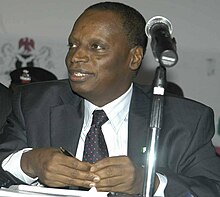National Planning Commission of Nigeria
| Dr Shamsuddeen Usman | |
|---|---|
 |
|
| Minister, National Planning Commission | |
|
In office December 2008 – September 2013 |
|
| Preceded by | Sanusi Daggash |
The Federal Ministry of Budget and National Planning is one of the Federal Ministries of Nigeria.
It was originally set up by Decree No 12 of 1992 as the National Planning Commission and later amended by Act 71 of 1993. The core responsibility of the commission is the formulation of medium term and long term economic and development plans for the nation.
The National Planning Commission is headed by the Minister of National Planning, who is also the Deputy Chairman of the National Planning Commission. The Chairman of the Commission is the Vice President (currently, Prof. Yemi Osinbajo).
The National Planning Commission was originally established by Decree No 12 of 1992 and later amended by Act 71 of 1993. The Commission has the mandate to determine and advise the Government of the Federation on matters relating to National Development and overall management of the national economy. The detailed objectives, functions, powers and structure of the Commission are outlined under sections 2, 3 and 5 of the Establishment Act.
The Transformation Agenda is a medium term development strategy to speed up the actualization of the NV 20:2020. It is a framework for the actualization of the Federal Government's economic growth agenda during 2011-2015. The Agenda is anchored on the pillars and targets of the NV 20:2020 and it aims to i) create decent jobs in sufficient quantity to resolve the protracted problem of unemployment and reduce poverty, ii) lay foundation for robust and inclusive growth within the Nigerian economy, and iii) improve, on a sustainable basis, the well-being of all classes of Nigerians regardless of their circumstances and location. The four areas of focus of the Transformation Agenda are governance, human capital development, infrastructure and real sector.
The First National Implementation Plan (1st NIP), with the theme "Accelerating Development, Competitiveness and Wealth Creation", is a medium term plan for the actualization of the long term broad objectives and targets of the NV 20:2020. The 1st NIP is the period 2010-2013 and it aims to bridge the infrastructural gap in the country, optimize the sources of economic growth to increase productivity and competitiveness, develop a knowledge-based economy to deepen the technology base of the country, improve governance, security law and order, and foster accelerated, sustainable social and economic development in a competitive business environment. The 1st NIP contains priority projects and programmes of the Federal Government and investment plans for the State Governments. The total investment profile for 1st NIP is N32 trillion, with the Federal Government investing N10 trillion, and the States and Local Governments investing N9 trillion. The private sector will invest the remaining N13 trillion.
A Monitoring and Evaluation (M&E) framework has been established to track progress in the implementation of the 1st NIP to ensure high performance and accountability. The M&E framework also includes a Performance Contract between the President and the Ministers/Heads of agencies, which is cascaded down the Ministries and Agencies. A National M&E Report is produced annually.
...
Wikipedia
